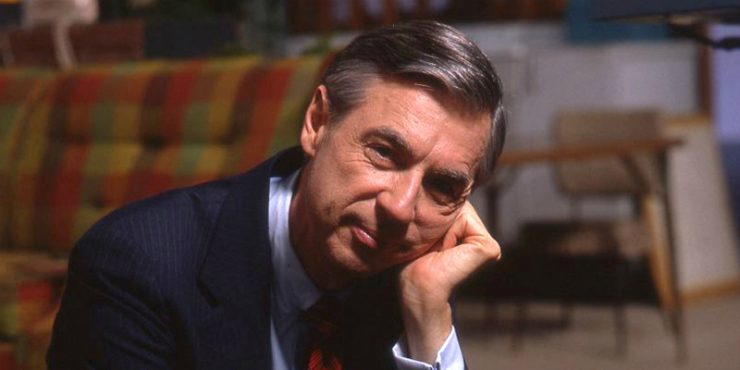I’ve never watched an episode of Mister Rogers’ Neighborhood during its 38-year run on public television. His image and cadence was, in fact, always played for parody when I was younger, nearly always mocked for the aggressiveness of its sincerity. True story: some friends of mine in high school – in some impromptu superlative – voted me as “The Next Mr. Rogers” before graduation, and I actually felt insulted. Morgan Neville’s Won’t You Be My Neighbor? paints a sentimental portrait of Fred Rogers, the man behind the sweaters and hand puppets. A devout Christian and registered Republican, Rogers took his role as an informer of children immensely seriously and preached his gospel of kindness and love. Neighbor is less a biodoc and more a further projection of Rogers’ important message, and the significance and simplicity of how he tried to send it.
From his origins as a chubby, shy child, Neighbor shows how the isolation of childhood led Fred Rogers toward his path of child recognition. Insulted by how television chose to entertain the young (with flashy, occasionally violent cartoons and slapstick comedy), Rogers decided to take it upon himself to make a program which would promote messages of thoughtfulness and compassion. “Love is at the root of everything,” he’s quoted as saying early in the film, “Love or the lack of it”. Like his program, Neighbor pays homage to the power and significance of everyday niceties, to the belief that feeling acceptance in your own singular self was the key to being special. Segments from Mister Rogers’ Neighborhood as well as clips from interviews and behind-the-scenes footage show how Rogers never wavered from this philosophy, that his power stood within his persistence.
His ambition as a television figure matched his talent in front of the camera, using the calming comfort of his intentionally- unimpressive sets, and the soothing sound of his on-air delivery, to send children messages of empowerment, but also to help them understand the tragedies of everyday life. His central ethos – inspired by an empathetic, inclusive spiritual relationship with Christianity – was that every human being had the right to feel loved; that any and all lost souls were the victims of lovelessness and exclusion. His weapon against hatred and divide was kindness, and he used this weapon with aplomb, but also with great force and insistence. He was motivated by a self-induced responsibility to make everyone know that your pain (or, in some cases, your hate) can be healed if you first acknowledge your own significance, and then you’ll be able to acknowledge the significance of others.
I was quite moved by this film, even free of the nostalgia of having watched the show. Morgan Neville, who won the Oscar for 20 Feet From Stardom, has a gift for finding the emotional center of his stories. This is certainly his most tear-jerky film to date. The movie has no intention of exposing dark secrets or hidden agendas (there’s only one unflattering moment when we’re told of Rogers’ initial reticence with a cast member’s homosexuality – a reticence that subsided), but instead becomes a panacea to our current day discord. Rogers’ success feels radical because of the natural fact of cynicism, because we allow the isolation of childhood to become the alienation of adulthood. The truth is that Rogers is asking for the bare minimum. His message seems so simple and clear when he explains it, and yet, it seems so removed from what we experience. When he asks for you to be his neighbor, he’s willing to negotiate the terms of civility, and here’s to hoping you choose love.
Directed by Morgan Neville










